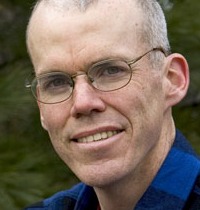Let us stipulate that climate change shouldn’t be a politically polarizing issue—physics has assigned us a straightforward task, which is to stop burning fossil fuel, and given us a tight timeline. As a world, we should be hard at work; it would be a hard task, but—especially if we’d started when we got our first warnings—well within our powers as a species.
Let us further stipulate that it clearly is a politically polarizing issue, probably the biggest of all time, because power and money are at stake, and the people who possess them under the current system (Exxon, Putin, the Koch Brothers) will do anything they can think of to avoid losing those possessions. That’s what this COP and all the others are really about: an effort to somehow overcome, or work around, that power. There are 636 registered fossil fuel lobbyists on hand here, and the biggest single delegation is from the United Arab Emirates; it’s quite possible that more of the people here want to keep the current order than undermine it.
Because the climate movement was decisively losing this fight, we needed to make it dramatic—we needed, say, to go to jail. That was absurd, at some level—why should someone have go to jail on behalf of physics? But changing the narrative requires getting people’s attention. That’s why my dear friend Svitlana Romanko got carried out of a room at the Egypt talks today—she’s the Ukrainian climate activist fighting fossil-fueled Russian fascism, and she refused to sit silently while Russian ‘diplomats’ told their lies. “I am glad that I named evil by name and I was able to tell them what all Ukrainians would like to tell them if they were here,” she said. “You are a terrorist state, you are genociding, torturing and killing us daily for nine months, your oil and gas are killing us. You are war criminals, you must not be here but in international court.”
But our job is not forever and just to make trouble; eventually, when we start to win, it’s the other side that will need to get desperate. And slowly, too slowly, it’s happening. This fall’s elections are more important than anything that’s happening here at Sharm el Sheikh, I think—the one in Brazil last month, and the ones across America last week, and the one that could come in Georgia early next month.
These elections were not, for the most part, fought on climate change, which in itself is something of an accomplishment. In the U.S., Biden’s main legislative accomplishment was the passage of the Inflation Reduction Act, which is mostly a climate bill, and arguably the most expensive new attempt by the federal government to proactively tackle a problem since the LBJ years. So the fact that the GOP didn’t go after it indicates they understood its basic popularity.
But the news is better than that. Exit polling indicates that for voters considered climate change the second most important issue facing the country—actually, it tied with abortion, and came in ahead of crime, despite the fact that those issues were the centerpieces of Democratic and Republican strategy. (The first place issue, of course, was “economy/jobs”, which is pretty much always the first place issue, because everyone needs a job and has to live in the economy.) A tenth of the populace now understands that climate counts more than anything else—which means that a much larger percentage understands that it counts an awful lot. In any event, a tenth is a big share. And that tenth is obviously concentrated among younger voters—who turned out in larger than expected numbers, and helped turn the election from a toxic red tide into something we can build on.
Still, the political fight continues, and will always continue as long as serious money and power continue to be at stake. Herschel Walker and Raphael Warnock come next, in a Georgia runoff in early December. It’s a crazy battle—between the man who may be the single most articulate U.S. Senator, and the one who would definitely be the least. Walker seems slightly fixated on climate change—early on he explained that we send “good air” to China so…nevermind. This week he added to his legend with a stirring defense of “gas guzzlers,” which is not what their defenders usually call them, but he was saying the noisy part out loud. Even Walker, however, understands there must be some problem associated with the internal combustion engine, so he added—mysteriously—”we got the good emissions under those cars.” And he said (and again, note the concession to some kind of reality) “If we was ready for the green agenda, I’d raise my hand right now. But we’re not ready right now.”
This has become the remaining defense of the fossil fuel industry—’it would be good to get rid of us, but we can’t yet, so wait a while.’ It’s dangerous nonsense, but it does illustrate how far we’ve moved the reality needle. Raphael Warnock, meanwhile, is not particularly noted as a climate warrior (he’s got other issues where he’s leading) but he too illustrates how far we’ve come: one of his big boasts headed into the runoff is that he helped land a big new battery plant near Augusta. And here’s how he spoke about it: “Georgia is open for business, and today’s announcement is good news for both Georgia’s growing clean energy economy and Augusta workers. I was proud to fight for and help secure the $178 million needed for this new facility, and I’ll continue to work closely with businesses looking to start or expand in Georgia to secure critical investments that will help create local, good-paying jobs.” Which is not the way I’d describe it—I’d go on and on about the low-carbon future or some such, which is why I’d lose the Georgia elections by a mile. (Also I live in Vermont). But it’s the right way for him to speak about it, because it’s almost dull.
In other words, Democrats have begun to normalize the transition we need to make, to assimilate it into the standard language of politics, and Republicans increasingly look like…morons. Walker actually seems quite dumb, but in this case it’s not his fault; he’s stuck by virtue of his party defending something stupid (“gas guzzlers”). It’s a harder and harder case to make with each passing quarter, because more and more people can read the future. Earlier this year the University of Georgia (whose football glory represents Walker’s main claim on voters) announced a big new center focused on “electric mobility.” “Developments in battery technology, the growth in electric vehicle sales, and the transition to renewable energy are a trifecta for significant societal and economic change delivered by higher levels of energy efficiency and cheaper electricity,” said Regents Professor Richard Watson. “UGA is poised to help Georgia switch on a new future.” The trustees of the University of Georgia are probably not particularly liberal, but they understand about $178 million battery factories.
This normalization is crucial, and ongoing. Another important development along these same lines yesterday, as Ben Jealous was named the new head of America’s biggest environmental group, the Sierra Club. The fossil fuel industry has worked long and hard to try and carve away Black voters and politicians, with donations and with common-man rhetoric. (If you’ve never read the NAACP’s reports on this “fossil fuel foolery”, they’re enlightening). But Black Americans remain among the staunchest supporters of action on climate change (because they are among its prominent victims). And now this tie will grow even stronger: Jealous, the former head of the biggest civil rights group in America (the NAACP), is going to lead its biggest green group. This represents a formidable kind of influence. (Jealous is also just good at what he does).
I don’t know if we can address the climate crisis in time; I do know it depends on this political evolution continuing, and speeding up. We have to break the effective power of the fossil fuel industry; it’s going to be close. We’ll need to continue being dramatic, because for now they’re still ahead. But we also need to be dull. Hail Mary passes, but also four-yards-in-a-cloud of dust grind-it-out running game. We’re starting to put points on the board.
In other news from around the world of climate and energy
+You can catch some more reflections from me along these lines on Ezra Klein’s podcast today. He is a formidably smart interviewer. Oh, and Newsweek has a wonderful account of how, among others, Third Act helped sway the crucial Nevada election.
+If you’re curious about carbon dioxide removal, Zeke Hausfather has a straightforward and modest account of what it can and can’t do in the Guardian.
We should not oversell the role of carbon removal. The vast majority of the time it is cheaper to reduce emissions than to remove CO2 from the atmosphere after the fact. Models that limit warming to 1.5C show that we need to reduce global CO2 emissions by around 90%, while only using carbon removal for around 10%. But 10% of the solution to a problem as big as climate change is still something we cannot afford to ignore.
+It’s with a sense of deep relief that we heard news today that Egyptian political prisoner Alaa Abdel Fattah was a)alive and b) had broken his hunger strike. His sister Sanaa released a letter the family had finally received; it’s possible that the biggest concrete achievement of this COP has been to shine a bit of light on him and his fellow prisoners in this police state. Meanwhile, at Truthout, David Goeßmann argues that after 27 COPs it might be time to try a new tack. He definitely understands the basic power dynamic, particularly evident this time with regard to ‘loss and damage.’
Negotiations and climate conferences can’t bring change on their own if major powers continue to block them. Climate diplomacy is effectively a power struggle between poor and rich countries, high and low emitters, the Global South versus the Global North. And in this struggle the developed countries have major advantages and the underdeveloped ones have no real leverage. Thus, necessary change will not come without mass political opposition within and against the powerful states like the U.S. or European countries, pushed through by civil society.
This is a fighting newsletter, and you can help it keep scrapping. If the modest subscription fee wouldn’t cause you economic hardship, it would be a real boon—but if it would, don’t worry for a moment and just keep reading.
Photo by Spencer Davis on Unsplash






